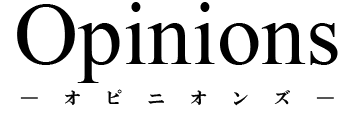
- 記事一覧
- ゲストライター記事一覧
- UK Careworker shortage, new visa, and risks 英国のケアワーカー不足、新たなビザと課題について
UK Careworker shortage, new visa, and risks 英国のケアワーカー不足、新たなビザと課題について

Care worker shortage
<< In 2021/22, there were 165,000 vacant posts (10.7% vacancy) for adult social care (Skills For Care, 2022: 60) >>
From the immediate impacts of Brexit and Covid-19 to the years of austerity, increasing privatisation, and unlivable wages in the sector run for profit, there is a severe shortage of care workers in the UK. Structurally, the gendered division and devaluation of care also continue to perpetuate low pay.*1 Despite the physically demanding nature of work that involves night shifts and live-in care work, over half are on precarious zero-hour contracts and more than 70% of care workers are paid less than the real living wage*2, leading to high vacancy and turnover rates.
<< On average, care workers in the UK are paid less than entry-level workers in supermarkets >>
Health and Care Worker Visa
In February 2022, care workers were added to the UK Immigration Rules’ Shortage Occupation List, relaxing the requirements for care workers to immigrate to the UK under the Health and Care Worker Visa.*4 Requirements for this status include a job offer by a government-licenced sponsor that meets the salary threshold of at least £20,480 per year and proof of English language proficiency *5 before entry.
While certificates and qualifications based on national occupational standards exist for the care sector, unlike in Japan, no national qualifications or examinations are required to work as a care worker *6 in England. Further, under this visa, migrant workers can be joined by their spouses and children, and after 5 years there is a route to settlement in the UK. There are fewer barriers to working as a migrant care worker in terms of linguistic and professional requirements, compared to Japan.
Risks in this visa category
Yet, this visa comes with very serious risks. Migrant care workers in the UK under this visa are dependent on their employers for their status, effectively tying workers to their employers (visa sponsorship). This system restriction functions as a barrier for workers to exercise their rights, similar to the mechanisms of the Technical Internship Training Program (TITP). Both these government schemes have been evidenced to induce high risks of human and labour trafficking, and debt bondage, a form of modern slavery.
An investigation by the Observer (2022) into this UK visa route found care workers from Asia and Africa*7 are charged exorbitant fees as high as £18,000 by recruitment agencies. *8 Such fees are illegal in the UK and against international labour standards (set by ILO), as it creates vulnerabilities for exploitation. Documented cases include workers trapped in debt bondage by having their passports confiscated by their employers until these fees have been “repaid” via their salaries. Even when workers are paid below minimum wage or face workplace abuse, the visa dependency on their employers is a barrier to speaking out, as documented in the TITP.
Calls for changes
In addition to living wages for care workers amidst support for public ownership of the care sector for improving the quality of services, *9 migrant workers and their advocates in the UK have called for
1) a reexamination of this UK visa route that makes workers dependent on their employers,
2) effective oversight of labour violations separated from immigration control, and
3) improved regulation to cut out illegal fee-charging practices by recruitment agencies
(Trust for London, 2022; The Guardian, 2022).
These calls demanding the UK government address its policy-induced vulnerabilities are analogous to what needs addressing by the Japanese government regarding the TITP. As both countries face an increased need for both care and migrant workers, there is a need for fewer barriers and risks to immigration alongside independent oversight and changes to ensure fair workplace conditions in which workers’ rights – living wages, family visas, and routes to settlement, among many others – can be realised.
介護士不足
英国では現在、介護労働者不足が深刻である。それは、イギリスのEU離脱やコロナ禍の影響といった直近のものから、長年の緊縮財政や民営化、そして営利企業が多くを占める介護業界における低賃金といったことが要因である。構造的にみると、ケア労働は歴史的に女性の役割とされ、低評価の対象となっていることも、低賃金が持続する要因となっている。夜勤や住み込みの介護業務など身体的にきつい仕事にもかかわらず、半数以上が不安定な「ゼロ時間契約」*3 で、70%以上の介護労働者の賃金は実際の「生活賃金」より低く、高い欠員率と離職率につながってる。
・2021~22年において、高齢者介護の業界における欠員件数は、計165,000件(欠員率10.7%)である(Skills For Care, 2022: 60)
・英国の介護士(介護労働に従事する労働者)の平均給与はスーパーの新入社員より低い
医療・介護従事者ビザ
2022年2月、介護士が英国移民規則の「労働者不足職種リスト」に追加され、介護士が医療・介護従事者ビザで英国に移住するための要件が緩和された。 この資格の要件は、政府認可の事業所から、年間20,480ポンド(約3,215,155円)以上の収入を伴う仕事のオファーを受けることと、入国前の英語能力の保持の証明である。
介護分野において、全国基準に基づく資格は存在するが、イギリスでは日本と異なり、介護士として働くために国家資格や試験を必要としない。さらに、このビザでは、移民労働者の配偶者や子供の滞在を認め、5年後には英国に定住することも可能となる。語学や資格上の要件など、介護現場で移民労働者として働く上での障壁は、日本に比べて少ないと言える。
医療・介護従事者ビザに伴うリスク
しかし、このビザには非常に深刻なリスクが伴う。当ビザでイギリスに移住する移民介護労働者は、イギリスでの滞在において雇用者に依存しており、事実上雇用者のビザのスポンサーシップなしにイギリスに滞在できない仕組みになっている。この制度上の制約は、日本の技能実習生制度の仕組みと同様、労働者が権利を行使する際の障壁となっている。両移民制度は、いずれも人身売買や強制労働などの人身取引、借金による束縛等のリスクを伴うと指摘されており、一種の「現代の奴隷制度」として機能しているといわれている。
英オブザーバー紙がこの医療・介護従事者ビザを使って渡英した移民労働者について2022年に調査したところ、アジアやアフリカ出身の介護労働者の多くが人材紹介会社から高額な手数料を取られており、この手数料は最悪の場合18,000ポンド(約2,825,820円)にもなることが判明した。このような手数料は英国では違法であり、移民労働者を搾取しやすい状況を生み出すため、国際労働機関(ILO)が定める国際労働基準に違反している。同調査によると、高額な借金を負わされた移民労働者の事例の中には、このような手数料を給与で「返済」するまで、雇用主からパスポートを没収されるケースも含まれるという。日本の技能実習制度同様、ビザの面で雇用主に依存しているがために、給与が最低賃金以下であったり、職場で虐待を受けている場合でも、職場において声をあげることが困難となるケースも見受けられる。
見直しを求める動き
こうした状況を変えるため、移民労働者や支援者らは、イギリスにおいて介護サービスの再公有化を通じてサービスの質の向上を求める声があがる中、介護労働者に対して生活賃金を保障することを訴え、下記を求めている (Trust for London, 2022; The Guardian, 2022)。
1) 医療・介護従事者ビザ制度において、ビザ発行・更新の面で労働者を雇用者に依存させる仕組みの再検討
2) 介護に従事する移民労働者の労働搾取摘発のため、出入国管理制度から独立した労働基準監督の仕組みの確立
3) 人材紹介会社による違法な手数料徴収を排除するための規制改善
こうした移民制度の問題点の改善をイギリス政府に求める要請の内容は、日本の技能実習制度の見直しにおいて求められる要請のそれと類似している。現在、両国において、介護サービスの拡大と移民労働者の受け入れの必要性が増す中、移住に伴う障壁やリスクを減らすことの他に、第三者機関による労働監督制度の確立、そして生活賃金の保障、家族滞在の権利、定住権、といった移民労働者の権利が実現できる公正な職場環境を確保するための改革が求められている。
ILO, 2022. “Women in the health and care sector earn 24 per cent less than men”.
Lister, J., 2020, “When Margaret Thatcher privatised social care,” Tribune. https://tribunemag.co.uk/2020/12/when-margaret-thatcher-privatised-social-care
Trust for London, 2022. “The vulnerability of paid migrant live-in care workers in London to modern slavery”.
The Observer, 2022. “Migrant care workers came to help the UK. Now they’re trapped in debt bondage”.
The Guardian, 2022. “Half of care workers in England earn less than entry-level supermarket roles”.
UK Government, 2022. “Health and Care Worker visa”.
We Own It, 2022. “Public Ownership is Popular”.
沼知聡子, 『英国:ゼロ時間契約の増加——柔軟な働き方なのか、雇用主による搾取なのか?』大和総研, 2013.
*1 In the UK, care workers are 80% women. Around the world, care work has been and continues to be disproportionately performed by women’s (unpaid or unequally paid) labour (ILO, 2022).
イギリスにおけるケア労働の80%は女性が担っているとされている。また、世界的にみても、介護などのケア労働のほとんどは女性が担っており、多くの場合無賃金、もしくは低賃金の仕事となっている。
*2 UK Living Wage is £9.90 an hour, the median pay for adult social carers in 2021/22 was £9.50 (Skills for Care, 2022).
「生活賃金(Living Wage)」とは、満足に日常生活を送る上で必要最低限の賃金のことを指し、イギリスでは時給9.90ポンド(約1,554円)がそれに値すると言われている。一方で、2021年~2022年において介護に従事する労働者の賃金の中央値は9.50ポンド(約1,491円程度)であった。
*3「ゼロ時間契約」とは、イギリスにおいて、雇用主が必要とするときに必要な時間のみに就労する就労形態のことを指し、就労時間が保障されていないため、労働者の権利が制限される等の諸問題が指摘されている(沼知, 2013 ※翻訳者追加)。
*4 In 2022, the majority of immigrants to the care sector were from outside the EU, most commonly from India, the Philippines, Ghana, Zimbabwe, and Nigeria (Skills for Care, 2022: 95).
2022年において、イギリスの介護現場で働く多くの移民労働者は非EU諸国から来ており、その大半はインド、フィリピン、ガーナ、ナイジェリアの出身である。
*5 Common European Framework of Reference for Languages (CEFR) B1
英語能力として、「ヨーロッパ言語共通参照枠」のB1レベル(中級程度)以上が求められる。
*6 Those who provide care for persons requiring support due to disability, illness, injuries, and old age in residential (care or nursing home) or domiciliary care (own homes).
本文において「介護従事者」とは、障害、病気、怪我、加齢などを理由にケアを必要とする者に対して、施設もしくは在宅にて介護に従事する労働者のことを指す。
*7 The Observer (2022) found workers from India, the Philippines, Ghana and Zimbabwe were being charged £3,000 to £18,000.
2022年のオブザーバー紙の調査によると、インド、フィリピン、ガーナ、ジンバブエ出身の移民労働者の背負う借金額は、3,000ポンド(約471,043円)~18,000ポンド(約2,825,820円)であった。
*8 In Japan, persons on the TITP shoulder debt averaging ¥547,788.
日本における技能実習生が背負う借金の平均額は547,788円であるといわれている。
*9 64% support social care in public ownership.
現時点で、イギリス市民の64%が介護サービスの公有化を支持しているという。なお、イギリスは1980年代、サッチャー政権下において同サービスの民営化が行われた (Lister, 2020 ※翻訳者追加)。

Recently Popular最近よく読まれている記事
-

食べていても痩せる 高齢者終末期のカヘキシア(悪液質)
食べていても痩せる。活発に運動を続けている人なら不思議に思わないが、介護度の高い高齢者にそのようなことが果たして起こるのだろうか。起こるのであれば、それはカヘキシアという病態であれば説明できる。 カヘキシア(悪液質)カヘキシアとは、食欲不振・体重減少・全身衰弱・倦怠感などを呈し、生命予後やQOL(qualit… -

終末期の自然な経過を見極めるとは
長期に渡り胃ろうからの栄養を続けていると、注入した物が食道へ逆流したり、唾液や痰の貯留が増えたりして、吸引を繰り返すことになるが、結局のところ、頻回の吸引も間に合わず、心肺停止状態で発見されることが多い。これでは看取りとは言えない。ここに至るまでの言葉を語れない人の苦しみ。このような事態を避ける智慧… -

自閉症スペクトラムと呼ばれているような障害は、実は障害ではない。生物としての人類のバリエーション(変異)の一つである。
自閉症スペクトラムと呼ばれているような障害は、実は障害ではない。生物としての人類のバリエーション(変異)の一つである。本来は人類の、生息環境に対する適応の一つのあり方だというのが、ニューロダイバーシテイ(脳多様性)という考え方に他ならない(詳しくは正高信男著『ニューロダイバーシテイと発達障害』(北大… -

社会保障分野での普遍主義と選別主義について
介護保険や医療保険では、貧富にかかわらず保険によって9割が給付(自己負担は1割)あるいは、7割が給付(自己負担は3割)される。この様な社会保障の方式は、「普遍主義」といわれている。「普遍主義」は、義務教育や、最近では高等学校の授業料にも適応されている(この場合も裕福な人も貧しい人も同様に無償である)。反… -

飲まず食わず(自発的飲食中止)という選択、VSEDをご存知ですか?
前回(Opinionsで9月24日配信記事)は有馬斉氏による安楽死の分類と、我が国の現状についてお伝えしました。また我が国においては、医師の致死的薬剤の処方による積極的安楽死は、法的に支持されていないということもお話ししました。諸外国では医師による致死的薬剤処方による安楽死が認められている国もありますが、もち… -

医療崩壊
ある日の外来。朝の9時から診察室に座りっぱなしでそろそろ3時間が経過。既に再診患だけではなく、その日の新患も回ってきます。で、そうした中に問題のおじさんがいました。「今、○○クリニックで薬をもらっていまして・・・」「30日分貰っているのですが、お腹が痛くなったので、診てもらいに来ました」「○○先生の紹介…
Writer ライター
-
 公職勤務/政策研究・防衛行政・文化政策黒乃 流星
公職勤務/政策研究・防衛行政・文化政策黒乃 流星黒乃 流星の記事を見る
-
 会社員宮田 宗知
会社員宮田 宗知宮田 宗知の記事を見る
-
 公益財団法人橋本財団事務局通信
公益財団法人橋本財団事務局通信事務局通信の記事を見る
-
 広島文教大学 教授/スクラムユニオン・ひろしま 執行委員岩下 康子
広島文教大学 教授/スクラムユニオン・ひろしま 執行委員岩下 康子岩下 康子の記事を見る
-
 「ことばの力教室」主宰 子どもの表現力育成アドバイザー/フリーライター・講師二村 昌子
「ことばの力教室」主宰 子どもの表現力育成アドバイザー/フリーライター・講師二村 昌子二村 昌子の記事を見る
-
 受賞作品Opinionsエッセイ
受賞作品OpinionsエッセイOpinionsエッセイの記事を見る
-
 ペンネーム東沖 和季
ペンネーム東沖 和季東沖 和季の記事を見る
-
 ニセコ在住下田 伸一
ニセコ在住下田 伸一下田 伸一の記事を見る
-
 ペンネーム 看護師宇梶 正
ペンネーム 看護師宇梶 正宇梶 正の記事を見る
-
 武蔵野大学大学院大谷 航介
武蔵野大学大学院大谷 航介大谷 航介の記事を見る
-
 一般社団法人村楽東 大史
一般社団法人村楽東 大史東 大史の記事を見る
-
 会社員池松 俊哉
会社員池松 俊哉池松 俊哉の記事を見る
-
 (公財)橋本財団研究助成 成果報告
(公財)橋本財団研究助成 成果報告研究助成 成果報告の記事を見る
-
 横浜市立大学小林 天音
横浜市立大学小林 天音小林 天音の記事を見る
-
 東京西徳洲会病院小児医療センター 小児神経科医師秋谷 進
東京西徳洲会病院小児医療センター 小児神経科医師秋谷 進秋谷 進の記事を見る
-
 公益財団法人地方自治総合研究所 常任研究員坂本 誠
公益財団法人地方自治総合研究所 常任研究員坂本 誠坂本 誠の記事を見る
-
 ペンネームAurora
ペンネームAuroraAuroraの記事を見る
-
 つむぐ株式会社 代表取締役竹村 仁量
つむぐ株式会社 代表取締役竹村 仁量竹村 仁量の記事を見る
-
 岡山大学学術研究院医歯薬学域長谷井 嬢
岡山大学学術研究院医歯薬学域長谷井 嬢長谷井 嬢の記事を見る
-
 ソシエタス総合研究所 研究員Karki Shyam Kumar (カルキ シャム クマル)
ソシエタス総合研究所 研究員Karki Shyam Kumar (カルキ シャム クマル)Karki Shyam Kumar (カルキ シャム クマル)の記事を見る
-
 NPO法人妊娠しぇるとSOS 理事長小林 智子
NPO法人妊娠しぇるとSOS 理事長小林 智子小林 智子の記事を見る
-
 書きたい人のためのwebマガジンOpinions編集部
書きたい人のためのwebマガジンOpinions編集部Opinions編集部の記事を見る
-
 介護福祉士渡口 将生
介護福祉士渡口 将生渡口 将生の記事を見る
-
 相談支援専門員・福祉ネイリストゆき
相談支援専門員・福祉ネイリストゆきゆきの記事を見る
-
 株式会社ありがとうファーム取締役副社長馬場 拓郎
株式会社ありがとうファーム取締役副社長馬場 拓郎馬場 拓郎の記事を見る
-
 ジャーナリスト ペンネームジョワキン
ジャーナリスト ペンネームジョワキンジョワキンの記事を見る
-
 ソシエタス総合研究所 研究員Andi Holik Ramdani(アンディ ホリック ラムダニ)
ソシエタス総合研究所 研究員Andi Holik Ramdani(アンディ ホリック ラムダニ)Andi Holik Ramdani(アンディ ホリック ラムダニ)の記事を見る
-
 ソシエタス総合研究所 研究員Waode Hanifah Istiqomah(ワオデ ハニファー イスティコマー)
ソシエタス総合研究所 研究員Waode Hanifah Istiqomah(ワオデ ハニファー イスティコマー)Waode Hanifah Istiqomah(ワオデ ハニファー イスティコマー)の記事を見る
-
 元芝園団地自治会岡﨑 広樹
元芝園団地自治会岡﨑 広樹岡﨑 広樹の記事を見る
-
 岡山外語学院留学生カーン エムディ マムン
岡山外語学院留学生カーン エムディ マムンカーン エムディ マムンの記事を見る
-
 行政書士板垣 岳人
行政書士板垣 岳人板垣 岳人の記事を見る
-
 Crimson Education教育コンサルタント蘇 暁辰(Xiaochen Su)
Crimson Education教育コンサルタント蘇 暁辰(Xiaochen Su)蘇 暁辰(Xiaochen Su)の記事を見る
-
 神戸大学准教授斉藤 善久
神戸大学准教授斉藤 善久斉藤 善久の記事を見る
-
 ドイツ在住阿部プッシェル 薫
ドイツ在住阿部プッシェル 薫阿部プッシェル 薫の記事を見る
-
 ライター/編集者黒部 麻子
ライター/編集者黒部 麻子黒部 麻子の記事を見る
-
 翻訳家田尻 潤子
翻訳家田尻 潤子田尻 潤子の記事を見る
-
 アブダビ環境庁長官 Environment Agency – Abu Dhabi (ead.gov.ae)シャイカ・サレム・アル・ダヘリ
アブダビ環境庁長官 Environment Agency – Abu Dhabi (ead.gov.ae)シャイカ・サレム・アル・ダヘリシャイカ・サレム・アル・ダヘリの記事を見る
-
 元整形外科医/農園主散木洞人
元整形外科医/農園主散木洞人散木洞人の記事を見る
-
 豊橋技術科学大学パク ミンジョン
豊橋技術科学大学パク ミンジョンパク ミンジョンの記事を見る
-
 生理革命委員会澤田まりあ、山形萌花、山領珊南
生理革命委員会澤田まりあ、山形萌花、山領珊南澤田まりあ、山形萌花、山領珊南の記事を見る
-
 SOMPOケア株式会社藤田 定司
SOMPOケア株式会社藤田 定司藤田 定司の記事を見る
-
 おかやま山陽高等学校橘 里香サニヤ
おかやま山陽高等学校橘 里香サニヤ橘 里香サニヤの記事を見る
-
 ソシエタス総合研究所 研究員坂入 悦子
ソシエタス総合研究所 研究員坂入 悦子坂入 悦子の記事を見る
-
 Hiro山下行政書士国際法務事務所 代表山下裕司
Hiro山下行政書士国際法務事務所 代表山下裕司山下裕司の記事を見る
-
 ソシエタス総合研究所 研究員Niklas Holzapfel ホルツ アッペル ニクラス
ソシエタス総合研究所 研究員Niklas Holzapfel ホルツ アッペル ニクラスNiklas Holzapfel ホルツ アッペル ニクラスの記事を見る
-
 サウンドエンジニアEmre・Ekici エムレ・エキジ
サウンドエンジニアEmre・Ekici エムレ・エキジEmre・Ekici エムレ・エキジの記事を見る
-
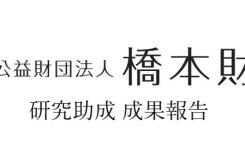 NPO法人岡山県国際団体協議会
NPO法人岡山県国際団体協議会岡山県国際団体協議会の記事を見る
-
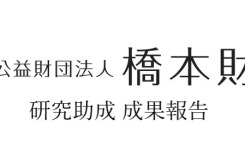 岡山大学 学術研究院 社会文化科学学域 教授東條 光彦
岡山大学 学術研究院 社会文化科学学域 教授東條 光彦東條 光彦の記事を見る
-
 福岡大学 名誉教授田村 和夫
福岡大学 名誉教授田村 和夫田村 和夫の記事を見る
-
 ソシエタス総合研究所 研究員相川 真穂
ソシエタス総合研究所 研究員相川 真穂相川 真穂の記事を見る
-
 一般社団法人京都総合科学研究所 アドバイザー松村 道郎
一般社団法人京都総合科学研究所 アドバイザー松村 道郎松村 道郎の記事を見る
-
 ワラム株式会社 代表取締役加藤 侑子
ワラム株式会社 代表取締役加藤 侑子加藤 侑子の記事を見る
-
 岡山市立操南中学校 教諭/NPO法人国際協力研究所・岡山代表理事竹島 潤
岡山市立操南中学校 教諭/NPO法人国際協力研究所・岡山代表理事竹島 潤竹島 潤の記事を見る
-
 新西横浜街の予防医療ケア研究室 保健師・看護師・元先端バイオ創薬ベンチャー取締役五十嵐 直敬
新西横浜街の予防医療ケア研究室 保健師・看護師・元先端バイオ創薬ベンチャー取締役五十嵐 直敬五十嵐 直敬の記事を見る
-
 共著橋本俊明・秋吉湖音
共著橋本俊明・秋吉湖音橋本俊明・秋吉湖音の記事を見る
-
 ライター菊池 洋勝
ライター菊池 洋勝菊池 洋勝の記事を見る
-
 大東文化大学国際関係学部・特任教授 高崎経済大学経済学部・非常勤講師 目白大学経営学部経営学科&目白大学大学院経営学研究科 非常勤講師 長崎県佐世保市役所 経済活性化~産業振興に関するアドバイザー、博士(経済学)江崎 康弘
大東文化大学国際関係学部・特任教授 高崎経済大学経済学部・非常勤講師 目白大学経営学部経営学科&目白大学大学院経営学研究科 非常勤講師 長崎県佐世保市役所 経済活性化~産業振興に関するアドバイザー、博士(経済学)江崎 康弘江崎 康弘の記事を見る
-
 ソシエタス総合研究所 研究員秋吉 湖音
ソシエタス総合研究所 研究員秋吉 湖音秋吉 湖音の記事を見る
-
 JICA専門家足立 伸也
JICA専門家足立 伸也足立 伸也の記事を見る
-
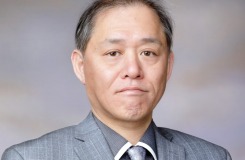 富士通株式会社 第三ファイナンス事業本部 シニアマネージャー安留 義孝
富士通株式会社 第三ファイナンス事業本部 シニアマネージャー安留 義孝安留 義孝の記事を見る
-
 EDAS(イーダス)理事長田村 拓
EDAS(イーダス)理事長田村 拓田村 拓の記事を見る
-
 監督・プロデューサー湯浅 典子
監督・プロデューサー湯浅 典子湯浅 典子の記事を見る
-
 日本経済大学 准教授山下 誠矢
日本経済大学 准教授山下 誠矢山下 誠矢の記事を見る
-
 人と医療の研究室 代表池尻 達紀
人と医療の研究室 代表池尻 達紀池尻 達紀の記事を見る
-
 一般社団法人飛島学園 代表理事堂野 博之
一般社団法人飛島学園 代表理事堂野 博之堂野 博之の記事を見る
-
 ニッセイ基礎研究所 生活研究部 主任研究員、ヘルスケアリサーチセンター・ジェロントロジー推進室兼任金 明中
ニッセイ基礎研究所 生活研究部 主任研究員、ヘルスケアリサーチセンター・ジェロントロジー推進室兼任金 明中金 明中の記事を見る
-
 医療法人財団足立病院 理事長、社会福祉法人あだち福祉会 理事長畑山 博
医療法人財団足立病院 理事長、社会福祉法人あだち福祉会 理事長畑山 博畑山 博の記事を見る
-
 教育研究家、合同会社ライフ&ワーク代表妹尾 昌俊
教育研究家、合同会社ライフ&ワーク代表妹尾 昌俊妹尾 昌俊の記事を見る
-
 ハーバード大学ベス・イスラエル・ディーコネス・メディカルセンター、高度消化管/最小侵襲外科フェロー中元 啓太郎
ハーバード大学ベス・イスラエル・ディーコネス・メディカルセンター、高度消化管/最小侵襲外科フェロー中元 啓太郎中元 啓太郎の記事を見る
-
 ソシエタス総合研究所 主任研究員井上 登紀子
ソシエタス総合研究所 主任研究員井上 登紀子井上 登紀子の記事を見る
-
 ソシエタス総合研究所 研究員松田 郁乃
ソシエタス総合研究所 研究員松田 郁乃松田 郁乃の記事を見る
-
 ソシエタス総合研究所 研究員アイシェ・ウルグン・ソゼン Ayse Ilgin Sozen
ソシエタス総合研究所 研究員アイシェ・ウルグン・ソゼン Ayse Ilgin Sozenアイシェ・ウルグン・ソゼン Ayse Ilgin Sozenの記事を見る
-
 NPO法人岡山市子どもセンター 事務局久川 春菜
NPO法人岡山市子どもセンター 事務局久川 春菜久川 春菜の記事を見る
-
 ユースワーカー(Youth Woker)森分 志学
ユースワーカー(Youth Woker)森分 志学森分 志学の記事を見る
-
 ペンネーム三村 喜久雄
ペンネーム三村 喜久雄三村 喜久雄の記事を見る
-
 ペンネーム黒木 洋一郎
ペンネーム黒木 洋一郎黒木 洋一郎の記事を見る
-
 NPO法人チャリティーサンタ 理事河津 泉
NPO法人チャリティーサンタ 理事河津 泉河津 泉の記事を見る
-
 金沢大学人間社会学域地域創造学類・准教授 、特定非営利活動法人国土利用再編研究所・理事長林 直樹
金沢大学人間社会学域地域創造学類・准教授 、特定非営利活動法人国土利用再編研究所・理事長林 直樹林 直樹の記事を見る
-
 認定NPO法人ペアレント・サポートすてっぷ理事長安藤希代子
認定NPO法人ペアレント・サポートすてっぷ理事長安藤希代子安藤希代子の記事を見る
-
 カリフォルニア大学サンフランシスコ校小児胸部心臓外科教授佐野俊二
カリフォルニア大学サンフランシスコ校小児胸部心臓外科教授佐野俊二佐野俊二の記事を見る
-
 社会福祉法人 旭川荘 ひらたえがお保育園 園長江田 加代子
社会福祉法人 旭川荘 ひらたえがお保育園 園長江田 加代子江田 加代子の記事を見る
-
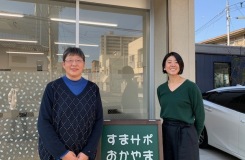 NPO法人 おかやまUFE 副理事長 ・NPO法人 おかやまUFE 事務局阪井 ひとみ・永松千恵
NPO法人 おかやまUFE 副理事長 ・NPO法人 おかやまUFE 事務局阪井 ひとみ・永松千恵阪井 ひとみ・永松千恵 の記事を見る
-
 社会学者 東京大学名誉教授 認定NPO法人ウィメンズアクションネットワーク(WAN)理事長 上野 千鶴子
社会学者 東京大学名誉教授 認定NPO法人ウィメンズアクションネットワーク(WAN)理事長 上野 千鶴子上野 千鶴子 の記事を見る
-
 外務省 国際保健政策室長 鷲見 学
外務省 国際保健政策室長 鷲見 学鷲見 学の記事を見る
-
 プロ・アダプティブ・サーファー藤原(旧姓:川上)智貴
プロ・アダプティブ・サーファー藤原(旧姓:川上)智貴藤原(旧姓:川上)智貴の記事を見る
-
 京都大学霊長類研究所 教授正高信男
京都大学霊長類研究所 教授正高信男正高信男の記事を見る
-
 社会医療法人石川記念会HITO病院緩和ケア内科統括部長大坂巌
社会医療法人石川記念会HITO病院緩和ケア内科統括部長大坂巌大坂巌の記事を見る
-
 東京医療学院大学保健医療学部教授上田 諭
東京医療学院大学保健医療学部教授上田 諭上田 諭の記事を見る
-
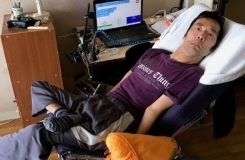 「夢を叶える145」ライター宮村孝博
「夢を叶える145」ライター宮村孝博宮村孝博の記事を見る
-
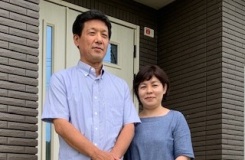 NPO法人 Anneの家 代表 美作地区里親会会員松本芳也・淳子夫妻
NPO法人 Anneの家 代表 美作地区里親会会員松本芳也・淳子夫妻松本芳也・淳子夫妻の記事を見る
-
 特定非営利活動法人あかね 代表理事中山 遼
特定非営利活動法人あかね 代表理事中山 遼中山 遼の記事を見る
-
 大阪市立総合医療センター 緩和医療科部長 兼 緩和ケアセンター長 大阪市立大学医学部臨床准教授 一般社団法人「こどものホスピスプロジェクト」常務理事 日本小児科学会専門医 英国カーディフ大学緩和ケア認定医(Certificate in Palliative Care) 日本緩和医療学会暫定多田羅竜平
大阪市立総合医療センター 緩和医療科部長 兼 緩和ケアセンター長 大阪市立大学医学部臨床准教授 一般社団法人「こどものホスピスプロジェクト」常務理事 日本小児科学会専門医 英国カーディフ大学緩和ケア認定医(Certificate in Palliative Care) 日本緩和医療学会暫定多田羅竜平多田羅竜平の記事を見る
-
 NPO法人 岡山マインド「こころ」/代表理事 一般社団法人お互いさま・まびラボ/副代表理事多田伸志
NPO法人 岡山マインド「こころ」/代表理事 一般社団法人お互いさま・まびラボ/副代表理事多田伸志多田伸志の記事を見る
-
 一般社団法人MY TREE代表理事 MY TREEペアレンツ・プログラムスーパーバイザー 認定フェミニストカウンセラー (公認心理師)中川和子
一般社団法人MY TREE代表理事 MY TREEペアレンツ・プログラムスーパーバイザー 認定フェミニストカウンセラー (公認心理師)中川和子中川和子の記事を見る
-
 兵庫県立ひょうごこころの医療センター精神科医師小田 陽彦
兵庫県立ひょうごこころの医療センター精神科医師小田 陽彦小田 陽彦の記事を見る
-
 独立行政法人国立病院機構福山医療センター院長岩垣博己・堀井城一朗・矢野 平
独立行政法人国立病院機構福山医療センター院長岩垣博己・堀井城一朗・矢野 平岩垣博己・堀井城一朗・矢野 平の記事を見る
-
 岡山大学 教授 文学部長田中 共子
岡山大学 教授 文学部長田中 共子田中 共子の記事を見る
-
 Civil Engineer (仕組みつくりの技術者)石田篤史
Civil Engineer (仕組みつくりの技術者)石田篤史石田篤史の記事を見る
-
 一般財団法人キヤノングローバル戦略研究所 研究主幹・経済学博士松山幸弘
一般財団法人キヤノングローバル戦略研究所 研究主幹・経済学博士松山幸弘松山幸弘の記事を見る
-
 岡山大学生殖補助医療技術教育研究センター ART教育研究部門長・教授舟橋 弘晃
岡山大学生殖補助医療技術教育研究センター ART教育研究部門長・教授舟橋 弘晃舟橋 弘晃の記事を見る
-
 医療法人サンズ理事長浅野 直
医療法人サンズ理事長浅野 直浅野 直の記事を見る
-
 株式会社ヘリオス 代表執行役社長CEO鍵本忠尚
株式会社ヘリオス 代表執行役社長CEO鍵本忠尚鍵本忠尚の記事を見る
-
 慶應義塾大学文学部人間科学専攻教授(医療人類学) McGill大学人類学部・医療社会研究学部Ph.D.北中淳子
慶應義塾大学文学部人間科学専攻教授(医療人類学) McGill大学人類学部・医療社会研究学部Ph.D.北中淳子北中淳子の記事を見る
-
 岡山大学病院 緩和支持医療科片山英樹
岡山大学病院 緩和支持医療科片山英樹片山英樹の記事を見る
-
 岡山市役所 保健福祉企画総務課松岡克朗
岡山市役所 保健福祉企画総務課松岡克朗松岡克朗の記事を見る
-
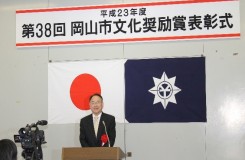 近現代史研究家青木康嘉
近現代史研究家青木康嘉青木康嘉の記事を見る
-
 独立行政法人国立病院機構福山医療センター院長岩垣博己・長谷川利路・中島正勝
独立行政法人国立病院機構福山医療センター院長岩垣博己・長谷川利路・中島正勝岩垣博己・長谷川利路・中島正勝の記事を見る
-
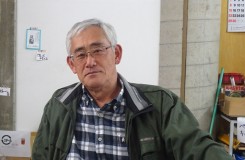 岡山高等学院 副校長 水野文一郎
岡山高等学院 副校長 水野文一郎水野文一郎の記事を見る
-
 社会の仕組み屋、社会の編集者石原 達也
社会の仕組み屋、社会の編集者石原 達也石原 達也の記事を見る
-
 一般社団法人SGSG理事長/中国学園大学子ども学部講師野村泰介
一般社団法人SGSG理事長/中国学園大学子ども学部講師野村泰介野村泰介の記事を見る
-
 一橋大学経済研究所 教授神林 龍
一橋大学経済研究所 教授神林 龍神林 龍の記事を見る
-
 特定医療法人自由会 理事 (社会福祉法人敬友会 理事、公益財団法人橋本財団 理事)橋本 健二
特定医療法人自由会 理事 (社会福祉法人敬友会 理事、公益財団法人橋本財団 理事)橋本 健二橋本 健二の記事を見る
-
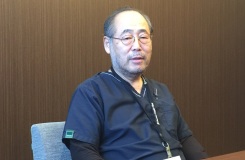 医療法人社団 岡山二人クリニック 理事長、医学博士林 伸旨
医療法人社団 岡山二人クリニック 理事長、医学博士林 伸旨林 伸旨の記事を見る
-
 フリーライター渡辺嗣郎(わたなべ しろう)
フリーライター渡辺嗣郎(わたなべ しろう)渡辺嗣郎(わたなべ しろう)の記事を見る
-
 国立大学法人岡山大学 副理事(国際担当)横井 篤文
国立大学法人岡山大学 副理事(国際担当)横井 篤文横井 篤文の記事を見る
-
 ペンネームドクターX
ペンネームドクターXドクターXの記事を見る
-
 NPO法人 山村エンタープライズ 代表理事藤井裕也
NPO法人 山村エンタープライズ 代表理事藤井裕也藤井裕也の記事を見る
-
 キャンサー・ソリューションズ株式会社 代表取締役社長桜井 なおみ
キャンサー・ソリューションズ株式会社 代表取締役社長桜井 なおみ桜井 なおみの記事を見る
-
 AMDA(アムダ) グループ代表・認定非営利活動法人AMDA 理事長菅波 茂
AMDA(アムダ) グループ代表・認定非営利活動法人AMDA 理事長菅波 茂菅波 茂の記事を見る
-
 ふれあい歯科ごとう代表五島 朋幸
ふれあい歯科ごとう代表五島 朋幸五島 朋幸の記事を見る
-
 介護従事者髙田 浩一
介護従事者髙田 浩一髙田 浩一の記事を見る
-
 ケアマネ-ジャー・社会福祉士かえる ちから
ケアマネ-ジャー・社会福祉士かえる ちからかえる ちからの記事を見る
-
 五常・アンド・カンパニー株式会社 代表取締役社長慎 泰俊
五常・アンド・カンパニー株式会社 代表取締役社長慎 泰俊慎 泰俊の記事を見る
-
 NPO法人 ポケットサポート代表理事三好 祐也
NPO法人 ポケットサポート代表理事三好 祐也三好 祐也の記事を見る
-
 医療法人 寺田病院 院長板野 聡
医療法人 寺田病院 院長板野 聡板野 聡の記事を見る
-
 鳥取市立病院 地域医療総合支援センター 生活支援室 副室長、リハビリテーション部 副部長、歯科 医長目黒 道生
鳥取市立病院 地域医療総合支援センター 生活支援室 副室長、リハビリテーション部 副部長、歯科 医長目黒 道生目黒 道生の記事を見る
-
 鳥取市立病院地域医療総合支援センター長 鳥取市福祉部参与足立 誠司
鳥取市立病院地域医療総合支援センター長 鳥取市福祉部参与足立 誠司足立 誠司の記事を見る
-
 ペンネーム池井戸 高志
ペンネーム池井戸 高志池井戸 高志の記事を見る
-
 ペンネーム池田 出水
ペンネーム池田 出水池田 出水の記事を見る
-
 岡山大学大学院ヘルスシステム統合科学研究科教授松岡 順治
岡山大学大学院ヘルスシステム統合科学研究科教授松岡 順治松岡 順治の記事を見る
-
 鳥取市立病院 名誉院長田中 紀章
鳥取市立病院 名誉院長田中 紀章田中 紀章の記事を見る
-
 岡山大学大学院保健学研究科 副研究科長 教授齋藤 信也
岡山大学大学院保健学研究科 副研究科長 教授齋藤 信也齋藤 信也の記事を見る
-
 公益財団法人橋本財団 理事長、医学博士橋本 俊明
公益財団法人橋本財団 理事長、医学博士橋本 俊明橋本 俊明の記事を見る

